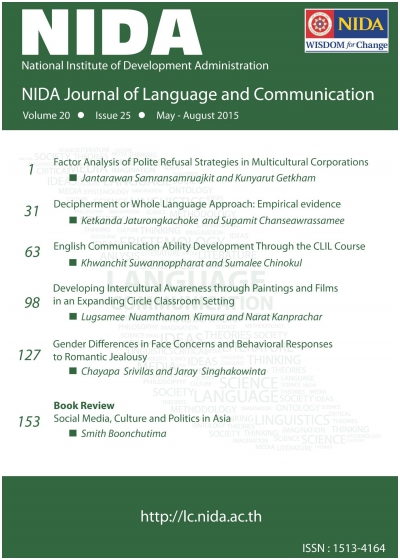Gender Differences in Face Concerns and Behavioral Responses to Romantic Jealousy
Keywords:
gender differences, face saving, communicative responses to jealousy, romantic jealousyAbstract
While jealousy is pervasive in every romantic relationship, it is undeniable that couples‘ jealous responses are culturally shaped by social influence. Analogous to other high-context cultures, Thais‘ responses to jealousy are presumably sanctioned by the cultural notion of face saving. Having a profound influence on Thai people‘s behaviors, this face practice is employed as a way to lessen or avoid possible conflicts in social interactions. The different views of individual men and women on jealous responses and face saving are thus the results not only of personal differences but also social expectations of gender performances. Consequently, gender differences can be said to engender relational conflicts and misunderstandings among romantic couples. Although the roles of men and women are often believed to complement each other in romantic relationships, these gender role distinctions are often found to cause resentment among disagreeing couples. Hence, the focus on behavioral responses in romantic jealousy may lack sufficient insight into the vital role of gender in romantic communication. This study therefore investigates a plausible impact of gender on face saving and communicative responses to jealousy in romantic relationships. In addition, it highlights the different practices of men and women in face saving strategies and their jealous responses.
Downloads
How to Cite
Issue
Section
License
By submitting a manuscript, the author transfers the copyright for the article to School of Language and Communication, National Institute of Development Administration (NIDA), if and when the manuscript is accepted for publication. Though the journal is an open-access, reproduction of any material published in NIDA Journal of Language and Communication for non-personal and/or commercial purpose requires a written permission from School of Language and Communication, National Institute of Development Administration (NIDA).






